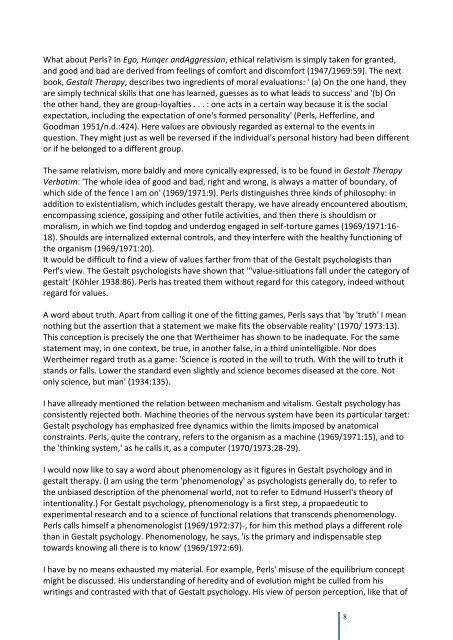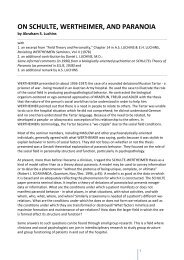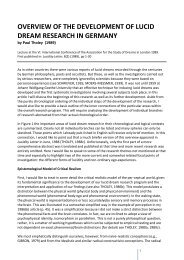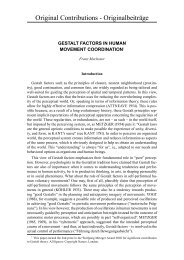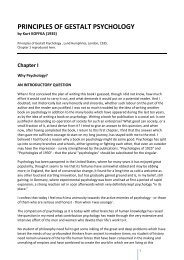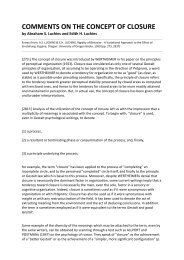Mary HENLE - Society for Gestalt Theory and its Applications (GTA)
Mary HENLE - Society for Gestalt Theory and its Applications (GTA)
Mary HENLE - Society for Gestalt Theory and its Applications (GTA)
- No tags were found...
You also want an ePaper? Increase the reach of your titles
YUMPU automatically turns print PDFs into web optimized ePapers that Google loves.
What about Perls? In Ego, Hunqer <strong>and</strong>Aggression, ethical relativism is simply taken <strong>for</strong> granted,<strong>and</strong> good <strong>and</strong> bad are derived from feelings of com<strong>for</strong>t <strong>and</strong> discom<strong>for</strong>t (1947/1969:59). The nextbook, <strong>Gestalt</strong> Therapy, describes two ingredients of moral evaluations: ' (a) On the one h<strong>and</strong>, theyare simply technical skills that one has learned, guesses as to what leads to success' <strong>and</strong> '(b) Onthe other h<strong>and</strong>, they are group-loyalties . . . : one acts in a certain way because it is the socialexpectation, including the expectation of one's <strong>for</strong>med personality' (Perls, Hefferline, <strong>and</strong>Goodman 1951/n.d.:424). Here values are obviously regarded as external to the events inquestion. They might just as well be reversed if the individual's personal history had been differentor if he belonged to a different group.The same relativism, more baldly <strong>and</strong> more cynically expressed, is to be found in <strong>Gestalt</strong> TherapyVerbatim: 'The whole idea of good <strong>and</strong> bad, right <strong>and</strong> wrong, is always a matter of boundary, ofwhich side of the fence I am on' (1969/1971:9). Perls distinguishes three kinds of philosophy: inaddition to existentialism, which includes gestalt therapy, we have already encountered aboutism,encompassing science, gossiping <strong>and</strong> other futile activities, <strong>and</strong> then there is shouldism ormoralism, in which we find topdog <strong>and</strong> underdog engaged in self-torture games (1969/1971:16-18). Shoulds are internalized external controls, <strong>and</strong> they interfere with the healthy functioning ofthe organism (1969/1971:20).It would be difficult to find a view of values farther from that of the <strong>Gestalt</strong> psychologists thanPerl's view. The <strong>Gestalt</strong> psychologists have shown that '"value-sitiuations fall under the category ofgestalt' (Köhler 1938:86). Perls has treated them without regard <strong>for</strong> this category, indeed withoutregard <strong>for</strong> values.A word about truth. Apart from calling it one of the fitting games, Perls says that 'by 'truth' I meannothing but the assertion that a statement we make f<strong>its</strong> the observable reality' (1970/ 1973:13).This conception is precisely the one that Wertheimer has shown to be inadequate. For the samestatement may, in one context, be true, in another false, in a third unintelligible. Nor doesWertheimer regard truth as a game: 'Science is rooted in the will to truth. With the will to truth <strong>its</strong>t<strong>and</strong>s or falls. Lower the st<strong>and</strong>ard even slightly <strong>and</strong> science becomes diseased at the core. Notonly science, but man' (1934:135).I have allready mentioned the relation between mechanism <strong>and</strong> vitalism. <strong>Gestalt</strong> psychology hasconsistently rejected both. Machine theories of the nervous system have been <strong>its</strong> particular target:<strong>Gestalt</strong> psychology has emphasized free dynamics within the lim<strong>its</strong> imposed by anatomicalconstraints. Perls, quite the contrary, refers to the organism as a machine (1969/1971:15), <strong>and</strong> tothe 'thinking system,' as he calls it, as a computer (1970/1973:28-29).I would now like to say a word about phenomenology as it figures in <strong>Gestalt</strong> psychology <strong>and</strong> ingestalt therapy. (I am using the term 'phenomenology' as psychologists generally do, to refer tothe unbiased description of the phenomenal world, not to refer to Edmund Husserl's theory ofintentionality.) For <strong>Gestalt</strong> psychology, phenomenology is a first step, a propaedeutic toexperimental research <strong>and</strong> to a science of functional relations that transcends phenomenology.Perls calls himself a phenomenologist (1969/1972:37)-, <strong>for</strong> him this method plays a different rolethan in <strong>Gestalt</strong> psychology. Phenomenology, he says, 'is the primary <strong>and</strong> indispensable steptowards knowing all there is to know' (1969/1972:69).I have by no means exhausted my material. For example, Perls' misuse of the equilibrium conceptmight be discussed. His underst<strong>and</strong>ing of heredity <strong>and</strong> of evolution might be culled from hiswritings <strong>and</strong> contrasted with that of <strong>Gestalt</strong> psychology. His view of person perception, like that of8


